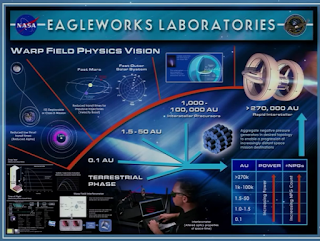Topics: FTL, Space Exploration, Spacetime, Star Trek, Wormholes
Since the 1994 paper by Miguel Alcubierre (and the physics caveats to attaining it), there has been some interest in this area just because of the vastness of interstellar space and the limitations since the Mercury Space Program of Newtonian Space Travel.
Also, it is unlikely we will come in contact with 5-dimensional hyper-humans that want to see to their ancestors' survival by popping up a wormhole next to Saturn (note: not a spoiler to "Interstellar" by now).
The problem being addressed is species survival - dinosaurs were animals with small brains that had a really BAD day 65 million years ago. We homo sapiens (Latin: "wise man") are not. With our demand for energy and resources going unabated, and the fact that our neighboring planets are so far uninhabitable, we are reduced to several options:
1. Conservation and resource restrictions: This has proven untenable as our economy at this point in history has been based on scarcity and charging a premium for that scarcity.
2. Plus, we'd have to forgo our Victorian compunctions regarding birth control, and stop encouraging both large families and early teen motherhood by ignorance of the same.
3. Terra-forming other planets: Which, I guess is the attraction to Mars and the four presumed volunteers to a one-way mission to the Red Planet (good luck). Mars has no breathable oxygen/nitrogen atmosphere; it is roughly 1/3 g, so bones would lose calcium and muscles would atrophy; temperatures can dip below -87 degrees Celsius (or, -124.6 degrees Fahrenheit). Getting there would take 150-300 days unless the VASIMR plasma rocket is available by 2020.
4. Conversion to non-fossil fuels based energy infrastructure: see #1.
Alpha Centauri is 4.367 light years away, that's if we had a craft that could attain 99.9999% of c, the speed of light. It sounds ideal until you take into account the affects of time dilation: that would be roughly 3,088 years for any twins our astronauts had back on Earth. The "right stuff" would be similar to those embarking on Mars One - not just the vastness of space, but of time itself as a gulf.
That's also if there's a habitable but largely uninhabited planet around its twin or triple star system. It would take our Newtonian conventional rockets 165,000 years to reach it (75,000 by Dr. White's comparison to Voyager), enough time and 6,600 generations in the first case for our descendants to forget WHY they were sent there in the first place. If they survive at all, humanity would be decidedly different than the breed that left the cradle of Sol and Earth Millennium ago. What is now us, would be a distant or forgotten memory.
Whether eventually warp or non-causality impacting relativistic speeds, humanity will have to decide it wants to travel to another world, and try not to replicate the mistakes we've made on this one on the next.

Comments